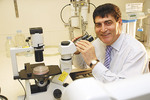Blood test for newborns to detect allergy risk
 Health Sciences Health Sciences
A simple blood test can now predict whether newborn babies are at high risk of developing allergies as they grow older, thanks to research involving the University of Adelaide. Professor Tony Ferrante, an immunologist from SA Pathology and the Children's Research Centre at the University of Adelaide, said the new marker may be the most significant breakthrough in allergy testing for some decades. "A protein in the immune cells of newborns appears to hold the answer as to whether a baby will either be protected, or susceptible to the development of allergies later on," Professor Ferrante said. Amounts of the cell signalling protein, called protein kinase C zeta, are much lower in children at risk of allergies. Professor Ferrante said the blood test was far more effective than previous indicators, such as a family's clinical history, or measuring the allergy-inducing antibody IgE. In collaboration with Professor Susan Prescott from the University of Western Australia and Princess Margaret Hospital for Children, Professor Ferrante's research team has refined the new marker for allergy risk, originally discovered in 2007, but now modified to a simple and manageable blood test at birth. The researchers are also looking at whether fish oil supplements given to both pregnant women and those who have just given birth can reduce the risks of the children developing allergies. "There is evidence that the levels of this important protein increase with fish oil supplementation to protect against allergy development," Professor Ferrante said. Australia has one of the highest allergy rates in the world, with 40% of children now suffering from allergic diseases, including food allergies, eczema, asthma and hay fever. These conditions frequently persist into adulthood, placing a heavy burden on the healthcare system. The studies and clinical trials have been funded by the Channel 7 Children's Research Foundation and the National Health and Medical Research Council. Professor Ferrante is SA Pathology's Head of Immunology at its Women's and Children's Hospital campus and Professor in the School of Paediatrics and Reproductive Health at the University of Adelaide. He has been a leader in his field for more than 20 years and leads the Developmental and Genetic Immunology Program of the Children's Research Centre. Story by Candy Gibson
|





